- Home
- Ernest Hemingway
Dateline- Toronto Page 12
Dateline- Toronto Read online
Page 12
This all may sound like a cold-blooded lack of appreciation, but while written in a personal way, it is an impersonal protest against wedding gifts as an institution. Some conference on limitation ought to restrict the giving of wedding gifts to the immediate parents of the bride and the immediate parents of the groom.
There are our stairs, for instance. Our landlord, a romanticist, when he rented the apartment, described it as a “third floor apt.” That was taking a very romantic view of it. Our landlord would probably refer to a villa on the extreme top of Mount Vesuvius as “an ideal location, well heated, reached by a pleasant climb, only 28 minutes from the heart of Naples.”
The first floor in the apartment is called an English Basement. The second floor, I believe, is a Mezzanine. After those two flights the floors proper begin. Ours is on the third floor proper.
Expressmen leave their packages at the English Basement. They do this to the accompaniment of a jovial shout of “One-eighty-nine!” That cabalistic cry means that you must pay the expressman one dollar and eighty-nine cents; a very considerable sum. Personally I have never seen a wedding gift that I would pay one dollar and eighty-nine cents for in cold blood. That, however, is a matter of opinion.
After you settle with the expressman, you stagger up five flights of stairs with the box. The box is always large and heavy. The first flight is comparatively easy; you take it in your stride and think of Alpine climbers, mountaineers and the nobility of toil. On the second flight you think of Mount Everest, the white man’s burden and how heavy the box is. After the second flight you just climb.
When you finally open the box, with the aid of a kitchen knife, you find it to be full of excelsior. You make some joke about excelsior. The excelsior spills all over the rug. You plunge into the excelsior in search of the present. It is like going into the center of a haycock in search of an egg. Lifting out a jumble-shaped package, you open it and find a beautiful broken bowl. It represents Uncle George. You drop Uncle George gently into the ashcan and try to get in a little more work before the bell rings again.
Twenty-two boxes came yesterday, forwarded from a distant city collect. One of them contained two handsome towels. They were not broken nor packed in excelsior in an enormous wooden box. Every little while I go over and fondle them lovingly. I do not know whose personality they represent, but I am sure it must be a very lovely one.
Tourists Scarce at Swiss Resorts
The Toronto Daily Star
February 4, 1922
LES AVANTS, SWITZERLAND.—Because the Swiss franc is still worth approximately twenty cents, the country is rapidly becoming impoverished. Tourists were always the principal Swiss source of income, and now tourists look at the exchange rates, see that they can get only five francs for a dollar, and stay away from Switzerland. As a result, parts of the country that were jammed with a tourist population before the war now look like the deserted boomtowns of Nevada.
Hundreds of hotels are closed in Switzerland, and the tourists are coming into the country in mere trickles of the streams that poured in before the war. The hotelmen are desperate. Wealthy Swiss people, when they want a holiday, go into the Austrian Tyrol where their francs will buy a bushel basket full of kronen. French people are not coming to Switzerland at all.
“I wish the Swiss franc would drop to the same value as the French,” the manager of a big hotel said to me today. “Then we might get our share of the flood of tourists coming to Europe now. Prices here are practically as low as similar resorts in the French Alps, but all the tourists want to get as many francs as they can for their dollars, so they stay away.”
As a matter of fact, the tourist would do as well in Switzerland as he would in France, for the big hotels in France and Italy counteract the rate of exchange by raising their prices in proportion. Room and board in a good Swiss hotel cost the tourist fifteen to twenty-five francs or three to five dollars. In a French hotel of the same class the rate would be thirty-five to fifty-five francs in French money, or three to five dollars.
The thing for tourists to remember is that all European hotel-keepers that have any clientele among tourists from America or England watch the exchange rates like hawks and make their room rates correspond to the pre-war value in dollars. So Switzerland is as cheap as anywhere else. But the tourists do not know it and Switzerland is paying the price of neutrality in a quite unforeseen way.
Living on $1,000 a Year in Paris
The Toronto Star Weekly
February 4, 1922
PARIS.—Paris in the winter is rainy, cold, beautiful and cheap. It is also noisy, jostling, crowded and cheap. It is anything you want—and cheap.
The dollar, either Canadian or American, is the key to Paris. With the U.S. dollar worth twelve and a half francs and the Canadian dollar quoted at something over eleven francs, it is a very effective key.
At the present rate of exchange, a Canadian with an income of one thousand dollars a year can live comfortably and enjoyably in Paris. If exchange were normal the same Canadian would starve to death. Exchange is a wonderful thing.
Two of us are living in a comfortable hotel in the Rue Jacob. It is just back of the Academy of the Beaux Arts and a few minutes’ walk from the Tuileries. Our room costs twelve francs a day for two. It is clean, light, well heated, has hot and cold running water and a bathroom on the same floor. That makes a cost for rent of thirty dollars a month.
Breakfast costs us both two francs and a half. That totals seventy-five francs a month, or about six dollars and three or four cents. At the corner of the Rue Bonaparte and the Rue Jacob there is a splendid restaurant where the prices are à la carte. Soup costs sixty centimes and a fish is 1.20 francs. The meals are roast beef, veal cutlet, lamb, mutton and thick steaks served with potatoes prepared as only the French can cook them. These cost 2.40 francs an order. Brussels sprouts in butter, creamed spinach, beans, sifted peas, and cauliflower vary in price from forty to eighty-five centimes. Salad is sixty centimes. Desserts are seventy-five centimes and sometimes as much as a franc. Red wine is sixty centimes a bottle and beer is forty centimes a glass.
My wife and I have an excellent meal there, equal in cooking and quality of food to the best restaurants in America, for fifty cents apiece. After dinner you can go anywhere on the subway for four cents in American money or take a bus to the farthest part of the city for the same amount. It sounds unbelievable but it is simply a case of prices not having advanced in proportion to the increased value of the dollar.
All of Paris is not so cheap, however, for the big hotels located around the Opera and the Madeleine are more expensive than ever. We ran into two girls from New York the other day in the Luxembourg Gardens. All of us crossed on the same boat, and they had gone to one of the big, highly advertised hotels. Their rooms were costing them sixty francs a day apiece, and other charges in proportion. For two days and three nights at their hotel they received a bill for five hundred francs, or forty-two dollars. They are now located in a hotel on the left bank of the Seine, where five hundred francs will last two weeks instead of two days, and are as comfortable as they were at the tourist hotel.
It is from tourists who stop at the large hotels that the reports come that living in Paris is very high. The big hotelkeepers charge all they think the traffic can bear. But there are several hundred small hotels in all parts of Paris where an American or Canadian can live comfortably, eat at attractive restaurants and find amusement for a total expenditure of two and one half to three dollars a day.
Poincaré’s Folly
The Toronto Daily Star
February 4, 1922
PARIS.—Canadian interest in European politics is as dead as a bucket of ashes. There are plenty of politics in Canada, and the good Canadian is sick of old-world tangles that are merely older and dirtier than the Dominion product. But all people who were in the war are interested in the inside reason for the turn of events that has cost France the sympathy of the world.
When the a
rmistice came, France occupied the strongest moral position any country could hold. People spoke of “The soul of France.” France was immaculate. And then came the peace conference of Versailles.
The world condoned the French attitude at the peace conference because the war was so recent and France had suffered so much that it seemed natural for her to make an unjust, conqueror’s peace. It was Clemenceau’s peace, his last tigerish move, for now Clemenceau is the deadest name in France. But it was an understandable peace, with the war so recent, and a forgivable peace.
Now the Versailles peace is a long time back, the war is over. Germany is making an earnest effort to build up her country to pay the money she owes the Allies and England is trying to help Germany that she may be able to pay. It is to France’s interest to see that Germany has a chance to pay, and she must see that the economic recovery of Germany is necessary if Europe is ever to get back to normal. But France keeps an enormous standing army, rattles the saber against Germany, destroys the effect of the Washington limitation of armament conference by adopting a Prussian attitude about submarines and talks of the next war.
Nobody that had anything to do with this war wants to talk about another war. Least of all should France want there to be a “next war.” The French people do not want any war. But, at present, the French people do not happen to be in control of the French government. That is the secret of the whole thing.
The present Chamber of Deputies, which corresponds to the Dominion Parliament, was elected in the year after the war, and the majority is held by the old reactionary party. They believe that they can get all the money they wish out of Germany if they only threaten her enough and cannot see that they will only produce utter bankruptcy and get nothing. They are the ones who want to go on and occupy the Ruhr basin, not realizing that the occupation would cost more money than she could get from the mines. They are too old to learn new things and they no longer represent the people who elected them.
Those old-line politicians were not satisfied with Premier Briand. He was too gentle, and he was fooling with that terrible thing, Russia. So they forced his resignation. Briand was not liberal enough for the Allies and the United States, but that made no difference. He was forced out and Poincaré made premier.
Now Poincaré and the blindest of the reactionaries are in the saddle and riding for all they are worth. But the ride will not be long, and it will be their last ride for a long time. It is the thin majority of the present chamber, coupled with the stupidest of the professional politicians that are giving the world the impression it is getting of France at present. It is a slim majority, and the next election will wipe it out; then France will resume her place as a nation with the good of herself and the world at heart, and cease to be a military power run by an irascible lot of old gentlemen.
For the French people have been thinking and working while their politicians have been talking. If they hadn’t been working so hard (unemployment has almost vanished in France) they would have kicked the present Chamber of Deputies out long before this.
Tuna Fishing in Spain
The Toronto Star Weekly
February 18, 1922
VIGO, SPAIN.—Vigo is a pasteboard-looking village, cobble-streeted, white- and orange-plastered, set up on one side of a big, almost landlocked harbor that is large enough to hold the entire British navy. Sun-baked brown mountains slump down to the sea like tired old dinosaurs, and the color of the water is as blue as a chromo of the bay at Naples.
A gray pasteboard church with twin towers and a flat, sullen fort that tops the hill where the town is set up look out on the blue bay, where the good fishermen will go when snow drifts along the northern streams and trout lie nose to nose in deep pools under a scum of ice. For the bright, blue chromo of a bay is alive with fish.
It holds schools of strange, flat, rainbow-colored fish, hunting-packs of long, narrow Spanish mackerel, and big, heavy-shouldered sea bass with odd, soft-sounding names. But principally it holds the king of all fish, the ruler of the Valhalla of fishermen.
The fisherman goes out on the bay in a brown lateen-sailed boat that lists drunkenly and determinedly and sails with a skimming pull. He baits with a silvery sort of a mullet and lets his line out to troll. As the boat moves along, there is a silver splatter in the sea as though a bushel full of buckshot had been tossed in. It is a school of sardines jumping out of the water, forced out by the swell of a big tuna who breaks water with a boiling crash and shoots his entire length of six feet into the air. It is then that the fisherman’s heart lodges against his palate, to sink to his heels when the tuna falls back into the water with the noise of a horse diving off a dock.
A big tuna is silver and slate-blue, and when he shoots up into the air from close beside the boat it is like a blinding fish of quicksilver. He may weigh 300 pounds and he jumps with the eagerness and ferocity of a mammoth rainbow trout. Sometimes five and six tuna will be in the air at once in Vigo Bay, shouldering out of the water like porpoises as they herd the sardines, then leaping in a towering jump that is as clean and beautiful as the first leap of a well-hooked rainbow.
The Spanish boatmen will take you out to fish for them for a dollar a day. There are plenty of tuna and they take the bait. It is a back-sickening, sinew-straining, man-sized job even with a rod that looks like a hoe handle. But if you land a big tuna after a six-hour fight, fight him man against fish until your muscles are nauseated with the unceasing strain, and finally bring him up alongside the boat, green-blue and silver in the lazy ocean, you will be purified and will be able to enter unabashed into the presence of the very elder gods and they will make you welcome.
Clemenceau Politically Dead
The Toronto Daily Star
February 18, 1922
PARIS.—There is nothing deader than a dead tiger and Georges Clemenceau was a very great tiger. Therefore Georges Clemenceau is very dead.
Coming from Canada, where an interview with Clemenceau still makes the front page of the newspapers, it is one of the big surprises to find that the one-time Tiger of France is as dead politically as that ex-president of France who lost his place through falling out of a moving Pullman car in his pajamas. No one quotes Clemenceau, no one in the government asks Clemenceau’s opinion, when you say “Clemenceau” people merely smile, and finally M. Clemenceau has been forced to start a small newspaper to get his views before the public at all.
If you want an explanation of the atrophy of Clemenceau as a political figure you can go to two places to get it. You may interview politicians who will talk about Versailles, the reparations question, open diplomacy, Genoa, the Ruhr basin, and the Kemalists. Or you can go to the cafés and get the truth. For no politicians could keep a man out of the public eye if the people wanted him.
In the cafés the Frenchmen have nothing to gain or lose by the things they say, so they consequently say the things that they believe. Of course if they have been sitting in a café too long they sometimes say even more than they believe. But if you catch a Frenchman when he has been in the café just long enough to come to a boil, and before he has begun to boil over and spill on the stove, you will find out what he really thinks of Clemenceau or anything else. And if you catch enough Frenchmen in different parts of France, you will have the national opinion; the real national opinion, not the shadow of the national opinion that is reflected in elections and newspapers.
“The things Clemenceau says have turned sour in the mouths of the people. They do not taste like truth. They may have been true once, but they do not taste true now,” one Frenchman told me.
“But has everyone forgotten what he did in the war?” I asked.
“The war is over and he was a very great tiger in the war, but he wanted to go on being a tiger after the war. After the war tigers are a handicap to a country. You need workhorses and mules, maybe, but not tigers. The people are tired of Monsieur Clemenceau, and he will have to wait until he is dead to be a great man again.”
That is the
result of the talk of many Frenchmen. It does not go into details, nor cite instances, but France wants a new type of statesman and needs him badly. She wants a builder instead of a fighter, a man who will think forward instead of backward, and because there is no fighting to be done, with the callousness of republics, she has dropped Clemenceau. He lived too long after his job was finished, and now, as the Frenchman in the café said, “he must wait until he is dead to be a great man again.”
German Export Tax Hits Profiteers
The Toronto Star Weekly
February 25, 1922
BASEL, SWITZERLAND.—Germany has passed a law taxing exports that makes it impossible for foreigners to buy enormous quantities of German products and make four or five hundred percent profit on them through the low value of the German mark.
Now, when you enter Germany, you are required to furnish the German customs officials with a list of absolutely everything you take into the country. This includes pairs of socks, underclothing, shirts, and even handkerchiefs. No personal clothing is exempt. When you leave Germany, all your belongings are checked over and if you have one shirt more than when you entered the country, you pay a fat export tax on it that robs it of its value as a bargain.
As you go back into Switzerland from Germany you must present your German lists of belongings again and an import tax is levied on anything you have paid to bring out of the German republic. It is a wonderful example of getting them coming and going.
Both Germany and Switzerland have been forced to protect themselves in this manner because of the tremendous difference in value of their money. Before the export and import taxes went into effect, Germany was a happy hunting ground for Swiss exchange pirates. Anyone with a Swiss ten-franc note could buy a half basket full of German marks and it took the Swiss living along the German border about as long as it does a cat to smell fish to realize what they should do with those marks.

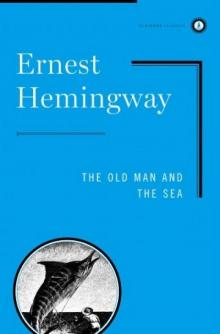 The Old Man and the Sea
The Old Man and the Sea Green Hills of Africa
Green Hills of Africa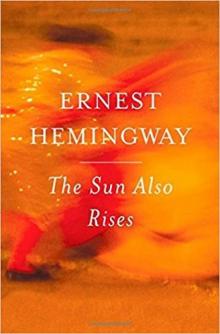 The Sun Also Rises
The Sun Also Rises Death in the Afternoon
Death in the Afternoon In Our Time
In Our Time For Whom the Bell Tolls
For Whom the Bell Tolls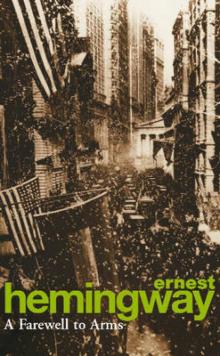 A Farewell to Arms
A Farewell to Arms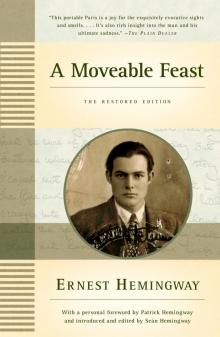 A Moveable Feast
A Moveable Feast The Complete Short Stories of Ernest Hemingway
The Complete Short Stories of Ernest Hemingway Big Two-Hearted River
Big Two-Hearted River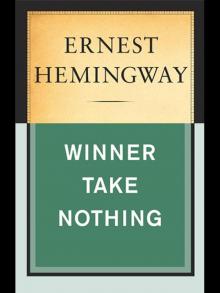 Winner Take Nothing
Winner Take Nothing Islands in the Stream
Islands in the Stream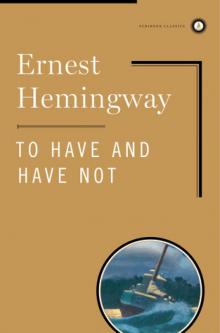 To Have and Have Not
To Have and Have Not The Snows of Kilimanjaro and Other Stories
The Snows of Kilimanjaro and Other Stories Across the River and Into the Trees
Across the River and Into the Trees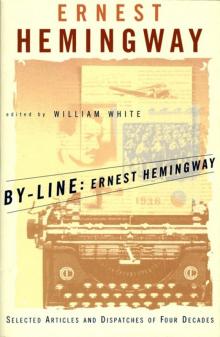 By-Line Ernest Hemingway
By-Line Ernest Hemingway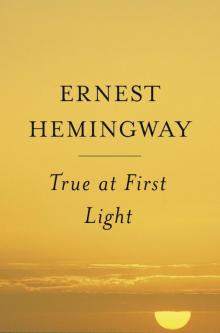 True at First Light
True at First Light Men Without Women
Men Without Women The Nick Adams Stories
The Nick Adams Stories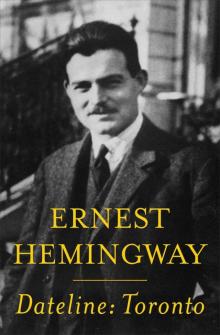 Dateline- Toronto
Dateline- Toronto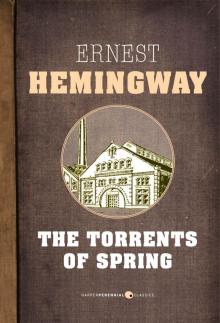 The Torrents of Spring
The Torrents of Spring Short Stories
Short Stories